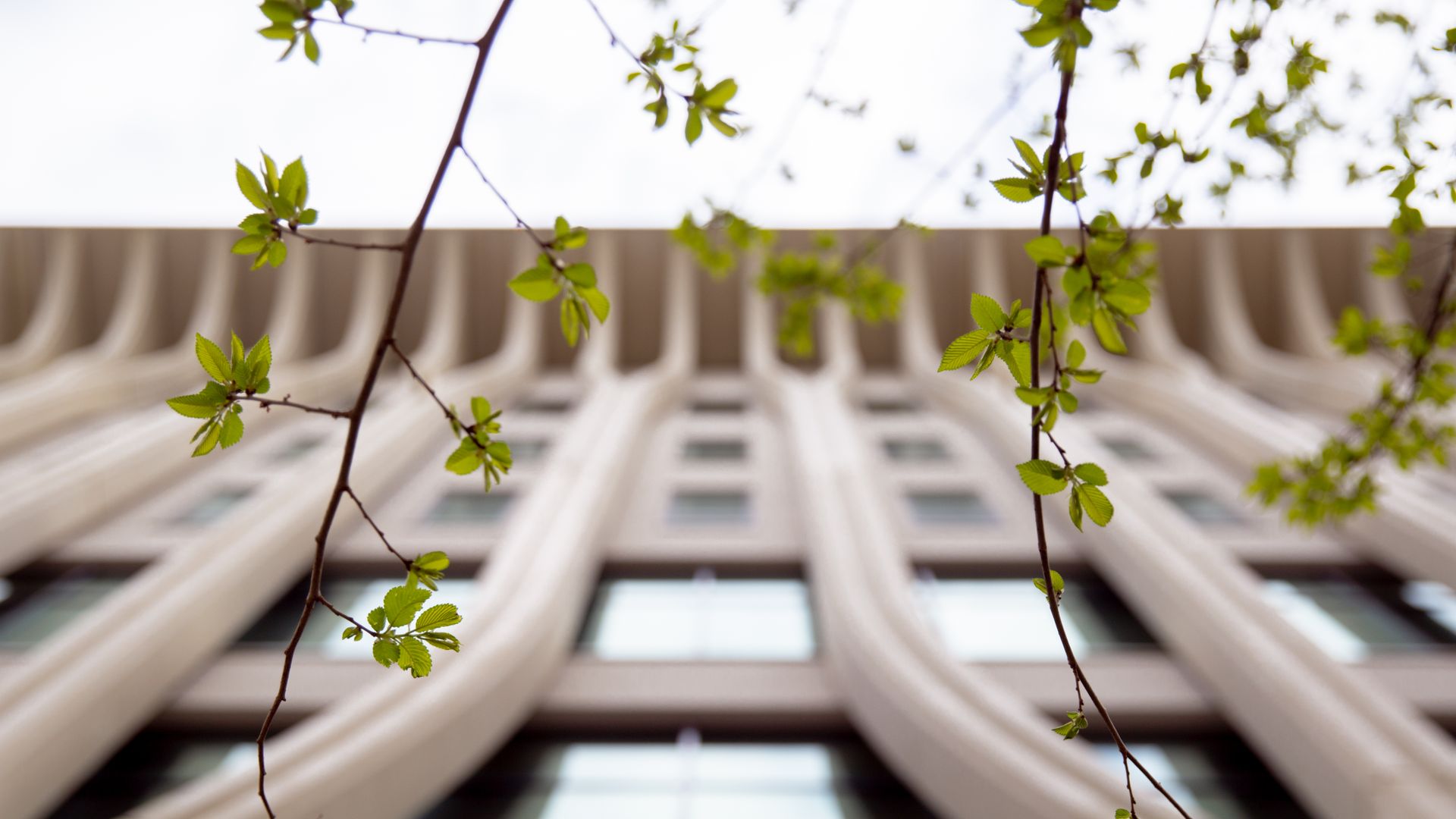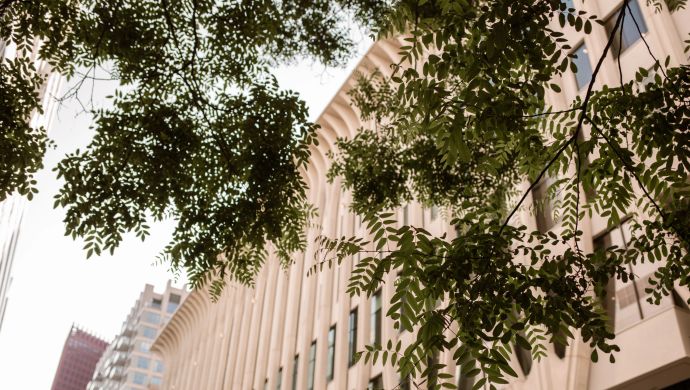
Sustainability in Amare

Sustainability is at Amare’s core. Amare is a sustainably built centre for the arts, in which a variety of measures have been implemented from the very start of the construction process. Read on to find out more about our efforts in the areas of sustainability and corporate social responsibility.
BREEAM-NL Excellent certificate

In March 2022, Amare obtained the BREEAM-NL Excellent Delivery Certificate! With a score of 79.21% on the set sustainability criteria, the design certificate already received in 2017 (70.29%) has been surpassed. With this 'BREEAM-NL Excellent' certificate, we are the first sustainably built performing arts complex in the Netherlands.
What is BREEAM-NL?
BREEAM-NL Excellent is an important certificate of sustainability. This sustainability assessment method for homes, offices and other types of buildings originated in the UK and has been adapted to fit Dutch and European legislation.
BREEAM-NL Excellent comprises nine categories of criteria that must be satisfied during a building’s construction: management, health, energy, transport, water, materials, waste, land use, and ecology and pollution. These criteria inform the entirety of the building process – meaning that the wish to obtain this important certificate has influenced the construction from the very start, and it will continue to apply to the building’s use and its management by the four resident organisations.
Cooperating for the certificate
All the parties involved in the construction of Amare cooperated to ensure the fulfilment of the BREEAM-NL Excellent criteria. Among others, these parties included the Municipality of The Hague as the client, Cadanz building consortium and Stichting Amare as the end user.
Solar panels and nest boxes
The following sustainable features were incorporated into the design:
- 4000 m2 of solar panels to generate energy
- Climate control system using geothermal energy
- LED lighting throughout the building
- Rainwater-flushed toilets
- Excess rainwater is infiltrated into the soil
- 50 nesting boxes for various species of birds incorporated in the facade
- 28 built-in bat boxes
Zero CO2 emissions
The certification also involved assessment of the actual construction process with regard to sustainability, for example how energy and water are used. The construction company used sustainable wind energy for its building activities, so there were no CO2 emissions from the building site. Also, 90% of the construction waste was sorted for disposal.
Sustainable and socially responsible
Now in operation, Amare continues to pursue sustainability and corporate social responsibility. The complex is easily accessible by public transport and by bicycle. All catering uses plant-based, organic, local products, and Amare’s staff reflects the composition of The Hague’s population, with many employees making new career steps on the labour market. And there are still many more certificates we aim to obtain!
Green Key certificate

Green Key is the leading international eco-label for sustainable businesses in the tourism, recreation and cultural sectors. In November 2021, Stichting Amare received its first Green Key certificate! Since then, it is being renewed every year.
Corporate Social Responsibility
Corporate Social Responsibility (CSR) means that a company focuses not just on maximising profits but also takes social (employees, society and animal welfare) and environmental aspects (reduced CO2 emissions, less waste) into account. It is about striking the right balance between People, Planet and Profit. Awareness of the importance of sustainability and corporate social responsibility has increased significantly in recent years.
However, it is not always clear to organisations how and where they can start implementing Corporate Social Responsibility. Having access to a manual that explains how to do this can therefore be very helpful, and Green Key provides exactly such a manual for businesses in the catering, recreation and tourism sectors. Having a Green Key certificate also makes it much easier for organisations to make their sustainable entrepreneurship efforts visible to guests and visitors.
Green Key
Green Key is an international certification label for sustainable businesses in the recreation and leisure sectors and the corporate market. Companies with a Green Key certificate make every effort to spare the environment without compromising on quality or their guests’ comfort. There are around 650 sites with a Green Key certificate in the Netherlands.
Accommodations with a Green Key certificate meet stringent criteria in the areas of sustainability, environment and CSR. These criteria concern communication; energy, gas and water usage; waste management; mobility; food and drink; green construction; sustainable procurement of non-food products; corporate social responsibility, etc. Different criteria apply for different sectors of industry. At this time, approximately 25 different business categories are covered, including hotels, campsites, holiday parks, convention centres, theatres and restaurants.
Imperative and guideline criteria
All companies must meet all imperative criteria as well as a number of guideline criteria. The imperative standards include basic CSR standards, such as registering and reducing gas, water and power usage, procuring environmentally certified cleaning products and reducing waste.
The guideline criteria go above and beyond this, including measures such as using renewable energy, hiring occupationally impaired employees and the separate collection of plastic. Meeting more of these optional criteria results in a higher certification grade (bronze, silver or gold).
The criteria are determined by the board of Stichting KMVK and satisfy the international Green Key criteria, which are determined by the Executive Board of FEE International.
What are Amare’s efforts in the area of CSR/Green Key?
Corporate Social Responsibility is an important theme at Amare. One of our objectives is to obtain and maintain a Green Key certificate. Our organisation has taken the following measures:
- Reducing water usage from taps and showers
- All public toilets are flushed with rainwater; the urinals are waterless
- Environmentally certified shampoos and hand soaps
- Environmentally certified fire extinguishers
- Minimising use of plastic products
- Using as few (or at least sustainable) cleaning products as possible
- Using sustainable printing paper, napkins and brochures
- Procuring organic and fair-trade food & beverage products, as much as possible
- Pursuing a sustainable procurement policy
- Minimising usage of paper
- Separate waste collection (glass, paper, PMD, Swill, rest)
- Reducing power usage through exclusive usage of LED lights and movement sensors for lighting and climate control
- Establishment of a Green Team that monitors and ensures compliance with agreements in the area of CSR.
- Sustainable collaborations, such as with JINC; JINC helps children aged 8 to 16 on their way to the labor market.
- Many regional collaborations, such as the Gnawa Festival: an initiative of five institutions in The Hague, each with their own expertise and Amare who facilitates it.
- We advise our visitors to travel to Amare by public transport instead of by car. The staff comes to Amare by public transport as much as possible.
For more information, visit the Green Key website: www.greenkey.nl
Sustainable collaborations
Stichting Amare (formerly Zuiderstrandtheater) has evolved from a venue dedicated mainly to stage presentations to a centre for presentation, coproduction and education. This means that we cooperate with a large number of partners from The Hague and beyond – cultural organisations, but social and educational institutions as well. These partnerships vary from migrant organisations and Cultuurankers (cultural anchors) geared to cultural diversity – including the esteemed Muziekcentrum 1001 Nachten – to festivals like Holland Dance, Rewire, De Betovering and Dag in de Branding, and from international venues such as South Bank London and Europalia Brussels to national organisations like CultuurSchakel and JINC.
Structural collaboration with JINC
Our organisation has collaborated with JINC for several years. JINC helps prepare children between the ages of eight and sixteen to make a good start on the labour market. It offers programmes to introduce children to a variety of jobs, to help them discover what kinds of jobs suit their talents, and to teach them how to apply for jobs. JINC’s programme is an excellent fit with Stichting Amare’s vision and ambition to be a home to the whole of The Hague, to be socially engaged and to serve as an educational meeting place. Our employees contribute as volunteers by participating in JINC’s programmes.
Regional collaboration
The Gnawa Festival proved its appeal in Zuiderstrandtheater, and is one of the events slated for further development in the new “house for the arts, events, education and cultural encounter.” Gnawa is the entrancing music of northern Morocco that has inspired musicians throughout the world. The Gnawa Festival is an initiative by Stichting Multicultureel Jongerengeluid, a foundation from The Hague, in collaboration with Het Nationale Theater, PAARD, Korzo Theater and Projazz. These are five organisations that each have their unique expertise, with Amare acting as facilitator. The Gnawa Festival is one of the initiatives through which Amare seeks to establish itself as the new “home” for the city and to fulfil its role as a unifying force: not a cultural temple for the elite, but a home whose doors are always open to everyone.
Food and drink
In de horecagelegenheden in Amare worden ook duurzame keuzes gemaakt.
Vanuit de visie van Juni Lekkernijen voor het verzorgen van duurzaam en verantwoord voedsel, vermindering van voedselverspilling en sociaal ondernemen, bereiden ze elke dag verse en gezonde maaltijden. De Stadskantine biedt een breed assortiment van puur en eerlijk eten zonder kunstmatige toevoegingen. Zo zijn er overnight oats, croissantjes, broodjes, soepen, een saladebar, wokgerechten, warme maaltijden en zoetigheden. Daarnaast zijn er altijd meerdere vegetarische en veganistische opties verkrijgbaar.
Juni Lekkernijen is kleurrijk in al het eten wat ze maken, de stijl en uitstraling maar ook in de medewerkers. 50% van de gewerkte uren wordt namelijk gewerkt door medewerkers met een afstand tot de arbeidsmarkt. En daarbij geldt er één regel: doen wat je leuk vindt, dat komt de rest vanzelf! Juni Lekkernijen maakt de gasten ervan bewust dat ze werken met partners die aansluiten bij duurzame keuzes, zoals Instock (gebruik van geredde groenten), Lekker Brood (100% biologische bakker en SKAL gecertificeerd) en Social Capital (sociale detachering). Ook werken ze met de groente- en fruitkalender, de kapstok waar het assortiment aan wordt opgehangen.
Bij Brasserie Amare staat duurzaamheid ook hoog in het vaandel. Zij streven er bijvoorbeeld naar hun producten zo lokaal mogelijk te bestellen. Zij steunen lokale initiatieven voor het kweken van producten die normaal van ver moeten komen. Ook kiezen ze waar het kan voor de duurzaamste opties. “Natuurlijk mag het de kwaliteit van ons eindproduct niet beïnvloeden; alles moet mooi in balans zijn. Dit geldt voor de hele organisatie, van schoonmaakproducten tot verpakkingen, energie en ingrediënten. Waar we kunnen, dragen we ons steentje bij!”
Mobility
Our accessibility page encourages guests to travel to our theatre by public transport. More information about Amare’s accessibility can be found here.
Printed matter
Our preferred printer processes orders in an intelligent and efficient manner, and is FSC-certified.
“This means that the paper we use for digitally printed products has been produced in accordance with the most sustainable standards. We also use solvent-free inks. The HP Latex inks we use are nickel-free and GREENGUARD-certified. Waste is separated and, where possible, recycled.
With regard to our machinery, sustainability is an important principle. Our digital printers are produced in a CO2-neutral manner, and we participate in the HP hardware recycling programme.”
CSR statement
Our CSR (Corporate Social Responsibility) statement explains and provides more information about our efforts, activities and achievements in the area of sustainability. The statement can be downloaded in PDF format below.
MVO statement (in Dutch) - DOWNLOAD


